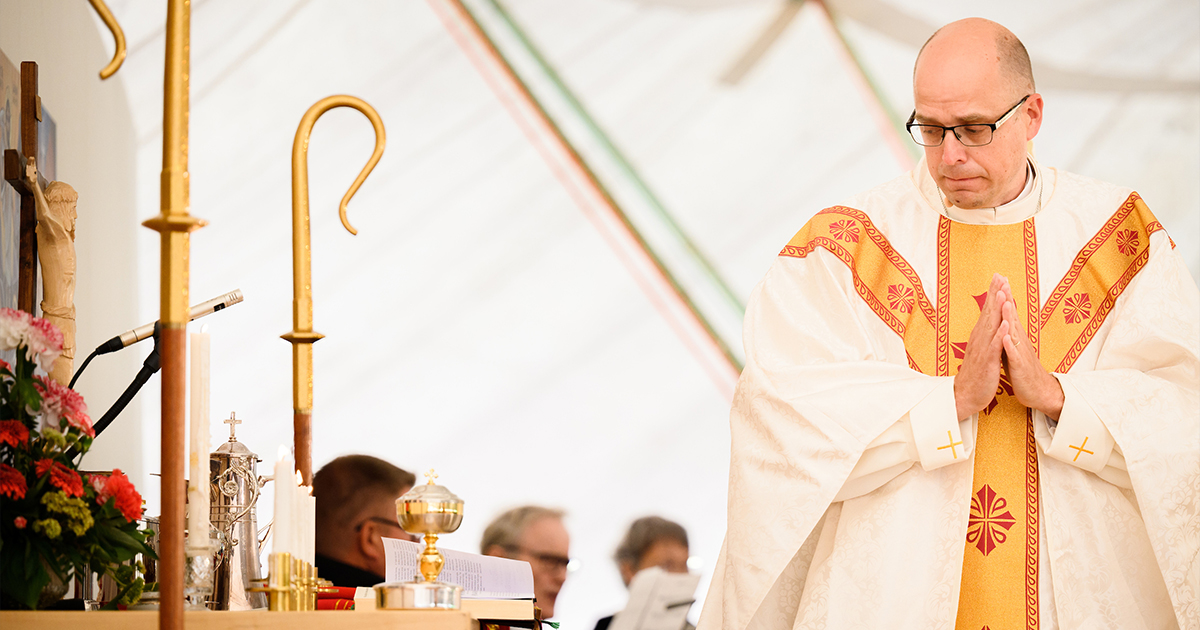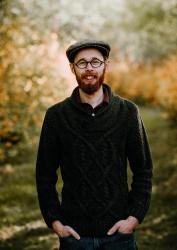In Finland, a prominent politician and a Lutheran bishop have been acquitted of hate crimes for the second time in as many years. On November 14, 2023, the Helsinki Court of Appeals issued its unanimous decision that Finnish Member of Parliament Dr. Päivi Räsänen and a Lutheran bishop, the Rev. Dr. Juhana Pohjola, be acquitted of all charges, upholding a 2022 decision by the District Court of Helsinki.
For the past four years, Bishop Pohjola and Dr. Räsänen have endured legal persecution for their articulation of historic Christian teaching on human sexuality. Dr. Räsänen is a prominent Finnish politician, having served as chair of the Christian Democrats party from 2004 to 2015 and as Finland’s Minister of the Interior from 2011 to 2015. Bishop Pohjola leads the Evangelical Lutheran Mission Diocese of Finland, a confessional Lutheran church body separate from the state church.
The charges against them stem from a 2004 booklet on human sexuality written by Dr. Räsänen and published by Bishop Pohjola. In that work, Dr. Räsänen discusses changing societal views on homosexuality, arguing that same-sex relationships are incompatible with the Christian understanding of natural law and Scripture. At the same time, she is clear that she recognizes the inherent worth of all people. “According to the Christian concept of humanity,” she writes, “everyone, regardless of sexual orientation, is equal and of equal value.”
But this Christian conception of humanity also teaches that God’s good creation is fallen and that all human beings are sinners in need of a Savior. “Jesus offers salvation to each of us,” she writes, “because we have all transgressed against the will of God.” The church can therefore consider homosexual relationships to be sinful even as it defends the inherent worth of those involved in these relationships—for they, too, have been created by God and are people for whom Jesus Christ has died. “God loves all sinners,” Dr. Räsänen explains, “but this does not negate God’s desire to save people from sin.”
This position, while not mainstream today, is hardly remarkable; it is the historic position of the Church down through the centuries. Nor is it remarkable that those who disagree with this understanding of sexuality might be offended by Dr. Räsänen’s words, even if she is not trying to offend. The possibility of being offended by others—to whom you need not listen if you do not wish—is a small price to pay in exchange for freedom of speech. It is a small price to pay for the freedom to follow the beliefs of your own choosing, and to express those beliefs publicly.
Raija Toiviainen, Finland’s Prosecutor General from 2018 to 2022, apparently disagrees with that assessment. Commenting on her decision to bring charges against Dr. Räsänen and Bishop Pohjola, she argued that people ought not to be allowed to use Scripture in a way that would “insult another person’s human dignity.”
In 2019, the Prosecutor General ordered police to conduct investigations into Dr. Räsänen’s statements on the grounds that they might constitute incitement against homosexual people. In 2021, the General Prosecutor laid charges against Dr. Räsänen for three of her statements that touched on human sexuality: a tweet in which she critiqued the state church’s decision to support a Pride event in Helsinki; a radio interview; and the aforementioned booklet, which was by this point already 15 years old and predated the legalization of same-sex marriage in Finland. Bishop Pohjola, as the publisher of the booklet, was also charged.
The decision to charge the two was met with widespread international concern, with various groups expressing alarm about what the case might mean for freedom of religion and freedom of speech in Finland—and, by extension, the rest of Europe. The International Lutheran Council (ILC), for example, released a public letter signed by leaders from 45 Lutheran church bodies across the globe, condemning “the unjustifiable criminal prosecution” of Bishop Pohjola and Dr. Räsänen and calling on authorities to “cease the prosecution of persons for the public expression of their faith.” A year and half later, Bishop Pohjola would be unanimously elected chairman of the ILC during its 2022 World Conference in Kenya—a testament to the global church’s continued support for him and Dr. Räsänen.
Meanwhile in the United States, for another example, a group of law professors from major universities issued a public letter to the U.S. Commission on International Religious Freedom, alleging the prosecutions “constitute serious human rights abuses.” The decision to charge a sitting Member of Parliament and a Lutheran bishop “sends an unmistakable message to Finns of every rank and station,” they wrote. “No one who holds to the traditional teachings of Judaism, Christianity, Islam, and several other religions on questions of marriage and sexual morality will be safe from state harassment should they, like Bishop Pohjola and Dr. Räsänen, express their moral and religious convictions.”
The initial trial, which took place in January and February 2022, did nothing to mollify these concerns. Following the hearings, Bishop Pohjola reflected that, although the prosecution had alleged the trial was “not about the Bible or about freedom of religion or opinions,” the prosecution nevertheless “went quite deeply into theological issues”—challenging the defendants’ interpretation of Scripture and personal beliefs on hermeneutics, sin, mercy, and more. The sight of a Lutheran bishop and a legislator put on trial in a European court of law for their religious beliefs was remarkable, and drew international media attention.
Nor did the trial revolve just around what Dr. Räsänen had said. The prosecution suggested that its own interpretation of her words—rather than what Dr. Räsänen intended to say or even what the statements themselves said in wider context—were sufficient to demonstrate criminality. “What the State Prosecutor read out [as charges], what she stated was written in the booklet, was untrue,” Dr. Räsänen noted. “Those statements were not found there—not on the radio program, not in the booklet, nor in the tweet.” The prosecution went so far as to accuse Dr. Räsänen of stating that homosexual people had not been created by God, when the booklet and other statements in question said the complete opposite!
In the end, the District Court of Helsinki ruled unanimously on March 30, 2022, that the two defendants be acquitted on all charges. The panel of three judges also issued a stern rebuke to the prosecution, stating that “it is not for the District Court to interpret biblical concepts.” The judgment further declared that the prosecution had in several instances misinterpreted or mischaracterized what Dr. Räsänen had actually said. Nor did the offense that some readers might take from her statements mean they were criminal in nature.
While the judgment came as a relief, the trial was far from over. The prosecution appealed the decision, leading to new hearings on August 31 and September 1, 2023, at the Helsinki Court of Appeals. It was in many ways a repeat performance by the prosecution, as they again focused on debating the defendants’ religious beliefs. The prosecution’s opening statement baldly asserted: “You can cite the Bible, but it is Räsänen’s interpretation and opinion about the Bible verses that are criminal.” Moreover, the prosecution continued, Dr. Räsänen’s personal intentions in making the statements in question were irrelevant; she should have refrained from using language that could offend homosexual people. It was the offense given—whether intended or not—that was criminal.
Bishop Pohjola called this open attack on religious speech shocking. “The prosecution is arguing that such religious and biblical teachings should not be protected in and of themselves, and that restrictions should be put on our speech,” he said. “But in a free society, there must be room for religious groups to publicly teach and confess their faith.”
The Helsinki Court of Appeals, in a unanimous judgment released on November 14, 2023, seemed to concur. It upheld the District Court’s earlier ruling and dismissed all charges against Dr. Räsänen and Bishop Pohjola. The court said it had “no reason, on the basis of the evidence received at the main hearing, to assess the case in any respect differently from the District Court,” and that there is “no reason to alter the final result of the District Court’s judgment.” The Court of Appeals also rejected the prosecution’s argument that Dr. Räsänen’s intent in making her statements was irrelevant to the question of guilt, writing that the offense “is punishable only if committed intentionally.”
“While I celebrate this victory wholeheartedly, I’m also saddened at the thought of the enormous state resources expended over the last four years to prosecute us for nothing more than the peaceful expression of our Christian faith,” Dr. Räsänen said after the decision was announced. “The basic human right to free speech remains under serious threat in Finland and around the world. No one should be punished for peacefully expressing their beliefs.”
The reaffirmation of their innocence, while welcome, cannot possibly undo the damage done to Dr. Räsänen and Bishop Pohjola over the past four years. They have endured police interrogations, character assassination in the court of public appeal, hours of grueling preparation for two trials, and the humiliation of being publicly prosecuted for their religious convictions—four years of mental anguish and uncertainty that cannot be undone. The process, as they say, is the punishment.
Nor is it just the two defendants who have been affected; the spectacle of Finland’s “Bible Trial” has had a chilling effect on wider society. After all, as Bishop Pohjola has said, “If they come after a Member of Parliament and a Lutheran pastor, they can come after you.” The message is clear: “Keep silent about these issues. Be filled with fear. Do not confess biblical truth publicly.” The damage done to freedom of speech and freedom of religion in Finland will linger long after the acquittal of Dr. Räsänen and Bishop Pohjola.
What is worse, there is no guarantee that this is the end of the matter either. The prosecution has indicated it may appeal to the Supreme Court of Finland. From there, the case could be elevated even higher to the European Court of Human Rights. Another four years of prosecution—and persecution—could very well still be on the table.
The defendants, however, are clear that they will see the process through however long it takes. “I decided that whatever comes—whatever the consequences will be—I will not give up,” Dr. Räsänen said after the latest verdict. “Because I felt that this is not only my opinion: it is the Word of God.”
Bishop Pohjola agrees. “Carrying the cross,” he said, “is the price we pay in this age to be witnesses for Christ.”

